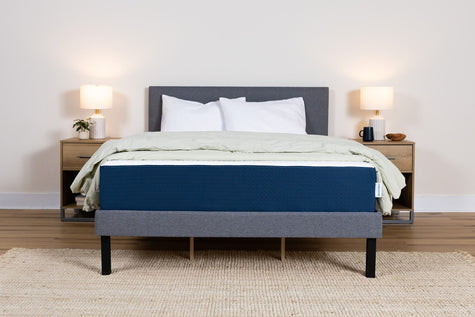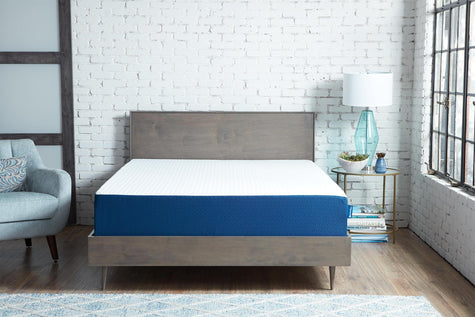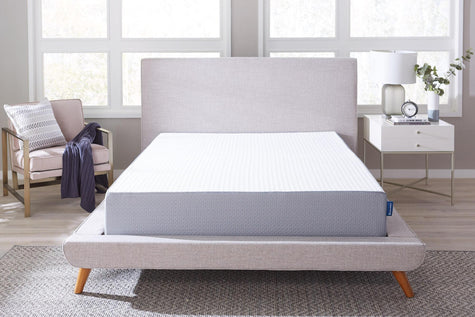Is It Time for a New Mattress?
The Health Hazards of an Old Mattress

Generally speaking, most sleepers don’t spend much time thinking about the life expectancy of their mattress. In fact, most of us keep our mattresses much longer than we should. It isn’t until our mattress pops a spring or we wake up with aches and pains that we realize it might be time for a new mattress. So, how long should your memory foam mattress really last? The longevity of your mattress varies based on a number of factors, such as the mattress construction and the quality of the materials. However, keeping an old mattress around for too long can actually have some damaging effects on our health. This guide will explore the ways in which an old mattress may be hurting your sleep health more than helping it.
Knowing When to Dispose of Your Mattress
While the life expectancy of a mattress may vary, the general consensus is that you should replace your mattress every seven to eight years. If well-cared for, a memory foam mattress can last up to ten years. At BedInABox®, we promise that your mattress will have a lifetime of at least eight years, if not longer, which is why we stand behind the quality of our mattresses with 10-to-20-year warranties. But the age of a mattress is just one indicator that it may be time to buy a new mattress. Other indicators that you should dispose of your current mattress include:
- Squeakiness: If you notice a lot of squeaking when you get into bed or change positions, there is likely something wrong with the springs in your traditional spring mattress. As your mattress springs wear down, they will no longer provide the support you need.
- Sagging: If you roll over in your bed only to sink into your mattress, then your mattress is breaking down. The breakdown of your mattress will ultimately be a source of discomfort and lack of support for you, especially if you have not been rotating your mattress regularly.
- Sleep Quality: The quality of your mattress can affect the quality of your sleep. If you suddenly find yourself struggling to sleep or you wake up feeling tired, it is absolutely possible that your mattress is a contributing factor.
- Changes in Your Weight: A lot can change over time, including your weight. Gaining or losing weight can affect how well you sleep on your mattress and how firm or soft your mattress will feel to you. A bed that once worked for you 5 years ago may no longer work for your current size.
How An Old Mattress Can Affect Your Health
Many people only associate old mattresses with discomfort. While it is true that old mattresses are often uncomfortable, they do wield a bigger danger to our overall health. There are more health hazards of old mattresses that can have long-term effects on our health than most are aware. Listed below are some of the health risks associated with an old mattress:
- Dust Mites: Our mattresses collect dead skin cells and body oils over time – that’s inevitable, even with the best care. This, in turn, attracts dust mites. Ohio State University experts have found that our beds house around 10 million of these microscopic bugs. While they are not exactly harmful, the growing presence of dust mites can eventually affect sleepers with allergies. Dust mite allergies may lead to sneezing, congestion and watery eyes. In severe cases, it can cause a tightening in the chest.
- Mold Development: Whether we like to admit it or not, all of us sweat in our sleep. That moisture combined with the dark underside of your mattress can actually breed mold. Breathing in mold can lead to respiratory health issues and mold can irritate your skin, resulting in rashes or hives. A simple solution to slow down or prevent the growth of mold is by covering your mattress with a liquid resistant mattress protector, like our BedInABox® Tencel Mattress protector. A mattress protector will not eliminate the overall wear of your mattress over time, but can definitely extend its lifespan.
- Extreme Back Pain: Old, worn mattresses cannot support you like they used to. An old mattress can become the source of severe, unbearable back and shoulder pain. Doctors even find that sleeping on an old mattress can lead to chronic back pain. In a study done by Oklahoma State, researchers tested how a new mattress can affect persistent back pain to find that a new, more supportive mattress can lead to a significant decline in back pain.
- Increased Stress: There is evidence to suggest that mental health concerns are, also, associated with sleeping on an old mattress. Getting a good night’s rest is vital to our mental health and because the discomfort of an old mattress can inhibit our sleep, our mental health can suffer, as a result. Specifically, there tends to be a rise in our stress levels when we do not maintain good sleep health.
Time for an upgrade? We've got you covered.
— BedInABox.com (@BedInABox) May 30, 2023
Shop your new mattress 👉 https://t.co/MCDqiTAYd2 pic.twitter.com/jZcWrRSalD
Finding the Right Mattress
Prolonged use of an old, unsupportive mattress is ultimately a risk to our health for many reasons. Admittedly, mattress shopping is not easy and can ultimately be a deterrent from upgrading to a new mattress. However, a quality mattress will improve the quality of your sleep - that’s where we come in. At BedInABox®, we offer six different mattresses that will serve and accommodate you according to your current sleep needs. Every BedInABox® memory foam mattress offers multiple layers of support, ranging from a medium-soft level of firmness to firm in feel. Still not sure which mattress will best suit you? Enter our 120-night risk-free sleep trial, so you can test nap your new mattress in the comfort of your own home.


